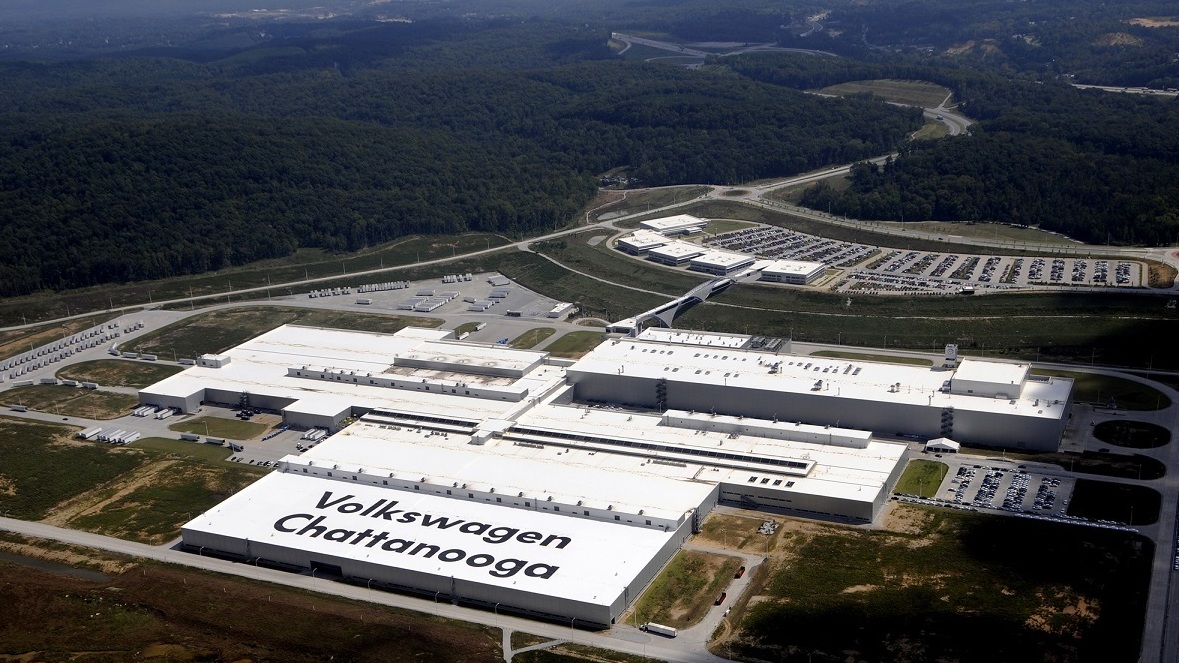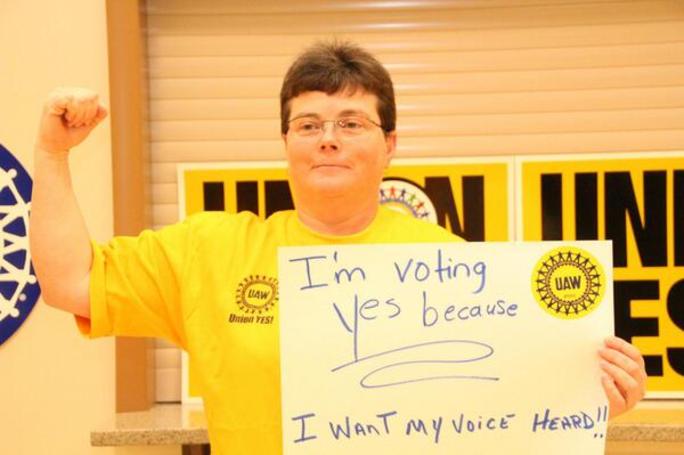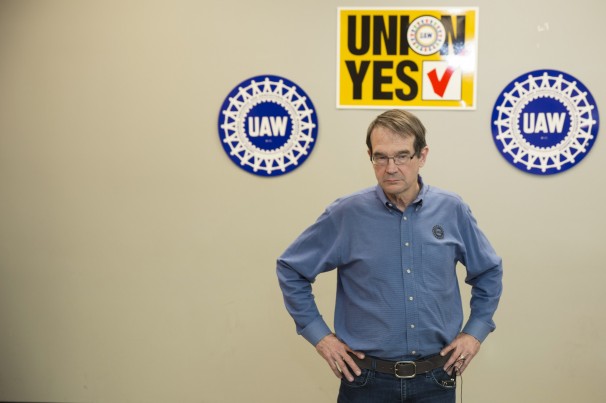by Ronald Lare
March 14, 2014
Last month, a National Labor Relations Board (NLRB) election was held in Chattanooga, Tennessee to determine whether the United Auto Workers (UAW) would represent over 1,500 Volkswagen workers in the three year old Volkswagen Chattanooga Assembly Plant.
The UAW lost the election, 712-626, after campaigning for a “works council” labor-management partnership model, which would legally require union representation. The union that represents Volkswagen workers in Germany, IG Metall, was very supportive of the “works council” concept and pressured the company to express their own support for the partnership and union vote. So, what went wrong?

Most of the analysis that’s been produced regarding the UAW organizing defeat at Volkswagen has focused on two factors:
- Republican politicians and PACs (money from “Political Action Committees”) defeated the UAW. The official union account emphasizes their impact on the election.
- The UAW’s own record of concessions to the “Big 3” (Ford, GM, and Chrysler) led to the defeat. Many on the left emphasize this record, arguing that it revealed a union that could no longer effectively fight for its own members.
Thus, there is much focus on the battle as “the UAW vs. Republicans” and “the UAW vs. the UAW’s own record.” Republicans did fight against the UAW with weapons including the racism that Martha Grevatt cites. And the UAW is at its weakest point in history–I agree with writers such as Gregg Shotwell, UAW-GM retired (author of “Autoworkers under the Gun”), and Katy Fox-Hodess, member of UAW Local 2865, on the role of the UAW’s weaknesses in this loss and I’ve seen those weaknesses up close in my 35 years as a UAW member at the Ford Rouge plant. I’m retired now, but still get phone calls, text messages, and e-mails from angry fellow local union members almost daily.
Unless we end two-tier wages and benefits, to name the most impactful concessions the UAW has made, the UAW is not going to organize much. As Fox-Hodess writes, “Now is the time to send a strong signal that the union is ready to strike next year to reverse concessions if necessary.”
However, I want to focus on going beyond both the “UAW vs. GOP” and “UAW vs. UAW” analyses. They can both lead to defeatist conclusions.
If Republican politicians alone can beat both a supposedly “pro-union” company–Volkswagen–that is “united” with a union–the UAW–then workers will think there’s no way to win. On the other hand, if the UAW’s record has zero attraction for workers, it’s finished. And neither theory squares well with the 47% “yes” vote.

I’d like to explore an additional possibility: it’s not so much that Republicans or the UAW’s own record defeated the UAW, as it is that Volkswagen beat the UAW. That’s the way socialists traditionally approach things: bosses vs. workers, capital vs. labor.
The neutrality agreement between Volkswagen and the UAW strikes me as the “neutrality” of the motionless person on the floor with an opponent’s foot on her or his neck: “Look, these two aren’t fighting any more, both must be neutral.” However, that the UAW agreed to a phony “neutrality” on Volkswagen’s part does not mean that the UAW didn’t lose to Volkswagen. Just because you didn’t fight your opponents doesn’t mean you didn’t lose to them.
When I was organizing as part of a UE (United Electrical Workers) drive in the 1970s, we took the position of the company to be exactly what we saw with our own eyes every day on the shop floor.
What did the Volkswagen workers in Chattanooga see every day on the shop floor?
Mike Elk’s investigation of the defeat in Labor Notes carries reports from union activists inside the Volkswagen plant. (Elk’s mother worked in the Pennsylvania Volkswagen plant that closed in 1988 when the company expanded operations in Puebla, Mexico.) In the print edition of Elk’s Labor Notes article (based on one that appeared online in In These Times), one Volkswagen worker told Elk how “low-level supervisors and salaried employees–who were not eligible for the union–ignored the directive and actively opposed the drive.”
Another Volkswagen worker explains, “The salaried people from [Volkswagen’s research and development center] stood out front every day this past week with [anti-UAW] shirts on, and I truly believe they swayed the votes their way.” That means there was no neutrality agreement on Volkswagen’s shop floor, no matter how much UAW Solidarity House fell for the bait-and-switch, and despite the NY Times’ acceptance of what the Big Names at Volkswagen and the UAW said, that “Volkswagen did not even oppose the unionization drive.” But the shop floor was more important to the outcome than the top floor.
The UAW agreed not to make home visits to workers in the Volkswagen drive. In the UE organizing drive that I mentioned above, our home visits to fellow workers were much of what we did. We made home visits in three languages with workers from several countries. If you cede both the shop floor and the living room floor, your quest to sit on the top floor in a works council is likely to fail.
In the UE drive, when our electronic components factory management broke the law, we called them out. We organized whatever shop floor resistance we could get away with prior to the vote. As far as we were concerned, we were a union fighting the boss even before the vote. We could slow down and “work to rule.” We could file NLRB charges. We could do these things because the UE didn’t pretend that the boss was “neutral.”
What would have happened if the UAW at Volkswagen had been what most workers look for in a union: a fight against the bosses wearing the “Vote No” t-shirts? Instead, the union gave that up on the basis of the assurances of “neutrality” that Bob King gets in phone calls to Germany.
I was asked recently at a meeting discussing the election result what the UAW could have done differently. I argued that the UAW should have turned all decisions over to the shop floor organizers and gotten out of the way. Workers can take over their own organizing drives. What’s left of the left should support them in that. In 2004, Georgetown, Kentucky Toyota workers who supported an independent weekly organizing flyer, “Outside Track,” contacted UAW-GM dissident Gregg Shotwell for support in their efforts to organize. In various places in the US, Latino and immigrant workers have gone on strike at non-unionized workplaces and only then called on a union to represent them–forcing unions to decide whether to support the organizing strike or be irrelevant.
I agree with writers including Sam Gindin (a former UAW and then Canadian Auto Workers official) who have called for left support for “minority unions” that declare their existence and represent workers as best they can and for as long as necessary before official elections for union representation.

UAW President Bob King (Christopher Aluka Berry, Reuters).
The UAW leadership lost sight of “them against us” not only on the shop floor, but in general ideological terms. At the same meeting discussing the UAW-Volkswagen result, a veteran UAW local office holder spoke. He said that another missing factor at Volkswagen and generally today is socialists and other radicals like those who were on shop floors in the 1930’s when the UAW was born. They are needed to spur and, in part, lead organizing drives by giving workers the big picture of labor versus capital and what lies down the road. Workers need to see the big picture regardless of the economy and culture of the moment. The UAW leadership is not going to preach socialism, but even a social democrat can tell workers that capitalism is in trouble. The Republicans as such didn’t take over the union movement–the neoliberals did.
To put this in more pragmatic language, socialists can smell a “good cop/bad cop” come-on like Volkswagen’s when a bureaucracy like the UAW can’t. This makes socialists the sharpest allies of street-wise shop-floor militants, whom the UAW leaders frown on in organized plants, and are thus unlikely to favor as leaders in unorganized ones.
This raises the question of whether the presence of socialists in the union movement is only tangentially, quite closely, or absolutely indispensably related to the success of the union movement. I believe it’s the latter of the three. I’d correlate the current situation of the UAW with the following observation.
When I hired in at Ford, I believe almost every co-worker in our local of tens of thousands was aware that they had known a socialist or communist in the local, regardless of their attitude toward such radicals. When I left 30 years later, there were extremely few workers who would make that statement.
Who were the cutting edges of the industrial union movement in the US in its heyday? Immigrants and socialists. Unions will be stronger when these diverse fighters are again a mass component of the shop floor leaderships in the US, as they still are in some other countries.
Ronald Lare is a former Executive Board member of UAW Local 600 (retired) and a member of Solidarity.

Comments
2 responses to “After UAW Defeat at VW, Finding a Way Forward”
A friend who worked with me on Ford Rouge assembly lines lives in Germany. Here’s his critical response minus a few words understandable only in other contexts. I disagree with some of it, and my “top floor” metaphor was meant to refer to UAW bureaucrats’ ambitions more than actual locations. But the metaphor is poor and he knows German practices well. Re VW tops giving Corker a green light, I remain suspicious. -Ronald
———————————-
Hey Ron,
Read your article in Solidarity with great interest. Many of your points – and your perception of things overall – seem on target and valid.
In German however they have a saying, “Es kann nicht sein, was nicht sein darf.” Which speaks to altering reality to match one’s own needs or expectations.
My problem: It feels like you’ve “engineered” VW’s approach into a surreptitious plot to defeat the (ultra-tame) UAW. In other words, even if the VW is demonstrably not doing this anywhere else, even in the face of strong, dynamic unions (like IG Metall), they were apparently determined to (secretly) stave off the ultra-tame UAW in Tennessee.
Well, okay. As you point out, if we don’t interpret things that way, it might lead to bad results for the state of class consciousness and class struggle (and also represent a mismatch to your earlier experience at UE).
But, I still think the argument that an adversarial, shop-floor approach was missing has merits of its own. Without having to “spin”, or even discuss VW management’s actual stance. Being proactive is a good policy in general, no matter what our adversaries may or may not be up to.
P.S.: The line that “If you cede both the shop floor and the living room floor, your quest to sit on the TOP FLOOR in a works council is likely to fail” [is misleading]….[In some ways] “Betriebsrat” is essentially a linguistic, not a political choice. In Germany – for over 100 years – they have always differentiated hugely between “Arbeiter” (hourly) and “Angestellte” (clerical; salaried) workers. The decision to call it a “Betriebsrat” simply allows them to avoid having to call it an “Arbeiter- und Angestelltenrat”. Calling the works council the “top floor” is… uh, to put it kindly, erroneous. Nobody from management is on (or sits on) the Betriebsrat, and salaried employees avoid involvement whenever they’re in the minority (i.e. at industrial enterprises). For banks, insurance companies etc., it’s different. There, almost all of the employees are salaried, and the unions—like hospital or public service unions in the States—can be quite militant. In the 80s, the HBV (Handel, Banken und Versicherung) union was known for its militancy, with strong involvement from the German CP (DKP). Including, naturally and unavoidably, ownership of the works councils (which are always BASEMENT, workers-rep level, NEVER EVER, EVER “top level”. Even the VW-Gesamt-Betriebsrat is employees-only, even if it may be in bed with VW management (like the UAW, only less so).
Ron Lare mentions the need for unions to depend on workers on the shop floor to do the organizing, and to support them. He also mentions “minority unions”–but some readers may not connect the dots. Volkswagen workers who talked with co-workers and voted for the UAW should continue their organizing efforts and FUNCTION right now as a minority union that can–give the 47% YES vote–become the majority a bit further down the road.